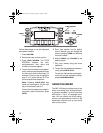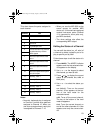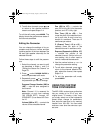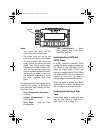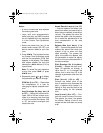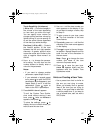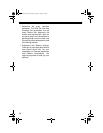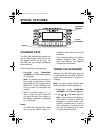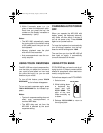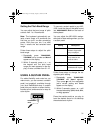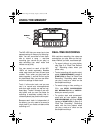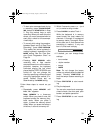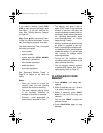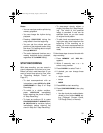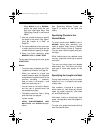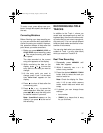
30
3. Within 5 seconds, press
+
or
–
to
raise or lower the keyboard's pitch.
Each time you press the key, the
number on the display increases or
decreases by 1 (cent).
Notes:
• The MD-1600 automatically resets
the tuning pitch to the default value
of 00 (cents) each time you turn off
the keyboard.
• Memory playback uses the pitch
with which it was recorded.
• Auto accompaniment uses the cur-
rently set pitch.
USING TOUCH RESPONSE
The MD-1600 has a touch response fea-
ture that lets you adjust the volume of
your music’s tone based on how hard
you strike the key(s), so you can add
emotion to your music.
To turn off this feature, press
TOUCH
RESPONSE
so its indicator disappears.
To turn on touch response again, press
TOUCH RESPONSE
so its indicator ap-
pears.
Notes:
• The touch response setting does not
affect auto accompaniment or
received MIDI data.
• The MIDI data sent out from the
MD-1600 is affected by the touch
response setting.
CHANGING AUTO POWER
OFF
When you operate the MD-1600 with
battery power, the keyboard automati-
cally shuts off after about 6 minutes if
you do not press a key. Press
POWER
again to turn power back on.
To have the keyboard not automatically
turn off during a session, turn the key-
board on while holding down
TONE
.
The next time you turn the MD-1600 off
then back on again, it automatically
turns off after about 6 minutes.
USING PITCH BEND
PITCH BEND lets you bend a note by al-
tering its pitch. It helps to create realistic
effects for saxophone, other reed instru-
ments, and guitar tones.
Follow these steps to use PITCH BEND.
1. Select a tone.
2. While holding down
a keyboard key,
rotate and hold
PITCH BEND
. The
pitch of the tone
slides smoothly up
or down.
3. Release
PITCH BEND
to return to
the original pitch.
PITCH BEND
42-4043.fm Page 30 Tuesday, August 3, 1999 6:51 AM



